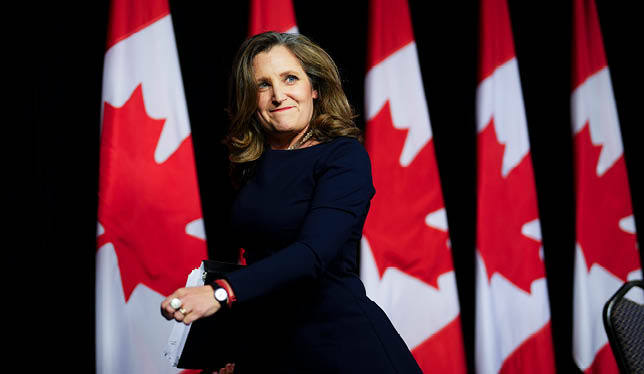Canadian researchers will be exposed to Brexit’s after-effects
As the U.K. proceeds with Brexit, Canada will likely prioritize collaboration with EU-based researchers over those in the U.K.

As Brexit uncertainty threatens research funding in the U.K., Canadian researchers will likely also be exposed to the effects and may choose to prioritize collaborations with EU-based researchers instead of U.K.-based researchers after Brexit. This is the finding of preliminary research conducted by Canadian scholars through an Insight Grant project, “The Reconfiguration of Canada-Europe Relations after Brexit,” funded by the Social Sciences and Humanities Research Council.
When Britain leaves the EU, U.K. researchers will have much more limited opportunities to apply to the EU’s flagship research-funding schemes, Horizon 2020 and its successor, Horizon Europe. U.K. researchers and companies are already receiving a much lower share of EU funding, according to a report from the U.K. Royal Society in October. The report provides firm evidence to substantiate longstanding speculation about how Brexit will affect U.K. research.
Since 2015, when a Brexit referendum was announced, funds flowing to the U.K. from Horizon 2020, the EU’s $113-billion (€77-billion) research funding scheme, have dropped 31 percent. U.K. applications to the scheme have dropped 39 percent. These decreases, the report concludes, have been caused by Brexit.
Read also: Attracting academic talent in the age of Brexit and Trump
The U.K. still ranks second among EU member states for funding from and participation in Horizon 2020, and U.K. applicants have received a net figure of $9 billion (€6.1 billion) from Horizon 2020 since its inception in 2014. Yet the U.K.’s exit from the European Union, which expected to happen by the end of January 2020, will put much of this funding in jeopardy.
Horizon Europe
Much depends on whether the country negotiates status as an associate member for Horizon Europe, the framework program that will succeed Horizon 2020 and runs from 2021-2027. Associate members, which include Norway, Iceland and Turkey, can participate on the same terms as member states.
It is difficult to see how the U.K. could negotiate associate member status in time for the opening of Horizon Europe in 2021. It would then have to participate under the much more limited “third-country” status.
If the U.K. was to be an associate member for Horizon Europe, this would presumably be negotiated as part of the agreements on the future relationship between the EU and the U.K.
Boris Johnson’s Conservatives, newly emboldened by an electoral majority, intend to re-introduce the withdrawal agreement in Parliament before Christmas Day. The result is that Britain will leave the EU in January. Once this has happened, negotiations can begin on their future relationship, including, presumably, arrangements for research cooperation.
Mr. Johnson has pledged that the U.K. must leave the EU by January 2021, when the “transition period” ends. He is unwilling to extend the transition period, although he has had to go back on his word before.
Yet negotiating a comprehensive deal will likely take several years. EU leaders may offer a skeleton trade deal to be ready by the January 2021, but it is uncertain whether this will address research funding. In any case, the next several months of negotiations will likely feature more brinksmanship and the threat that the U.K. will leave the EU without a deal.
This leaves U.K. researchers – and Canadian (and European) researchers who want to collaborate on U.K.-led projects – in a difficult position, especially if the U.K. is treated as a third country for Horizon Europe.
Canadian researchers participate in Horizon 2020 on a “third-country” basis. This status will probably stay the same for Horizon Europe, although the Canadian government is widely held to be negotiating a renewal of this status for Horizon Europe.
Canadian academic researchers and small- and medium-sized enterprises are currently permitted to collaborate with EU projects, but they have limited access to EU funding. Canadian researchers and small enterprises have been awarded $8.3 million (€5.6 million) as of October 2019. The University of Toronto tops the list of participating researchers with 28, while London, Ontario-based Sernova Corp. has received the most funding from the EU at $1.4 million (€950,000).
Yet this may change. Canadian participation in Horizon 2020 is already much more extensive than in the previous funding scheme, Framework Programme 7, which lasted from 2007 to 2013. And Canadian participation in Horizon 2020 and Horizon Europe is being encouraged at various levels.
The New Frontiers in Research Fund, which the Tri-Council agencies administer, includes $50 million to support Canadian participation in Horizon 2020 and Horizon Europe. Prime Minister Justin Trudeau announced this funding after a summit with European Council president Donald Tusk in July. Universities also continue to encourage researchers to seek external funding to stretch research budgets and support graduate researchers, and the growth of research facilitators at a number of universities suggests that this trend will intensify, as will competition for outside grants.
International collaborators
All of this suggests that Canadian researchers will be pushed to find international collaborators. Canadian researchers and companies already work extensively with U.K. coordinators, but the uncertainty caused by Brexit may hamper cooperation.
Canadian researchers have participated in 38 projects accepted for funding with a U.K. coordinator, according to EU data. This funding – some of which has been paid out already – is not under threat, because the U.K. government has guaranteed all existing EU funding. Yet the future prospects for such collaborations look stark.
Studying the number of applications – rather than successful applications – provides a better illustration of the connections between researchers in Canada and the U.K., and the potential disruption from Brexit. Only about one in six proposals with a Canadian or U.K. participant is accepted, according to EU data.
An extrapolation of this data suggests that 200 or more U.K.-led applications have included Canadian collaboration. Canadian researchers are also quite likely to collaborate with U.K. researchers on any project, with 328 collaborations in all. Canadians only collaborate more often with France (373 collaborations) and Germany (333 collaborations). Estimating the number of applications suggests that nearly 2,000 applications contained both U.K. and Canadian contributors, which is a substantial network.
Brexit would likely discourage Canadian researchers from collaborating with U.K. researchers under existing policy rules, because there is currently much less funding available to support Canadian collaboration with the U.K. The EU’s flagship funding schemes are very lucrative, with research budgets set to rise for Horizon Europe despite the U.K.’s exit.
Much depends on whether the U.K. government will make available sufficient research funding to compensate for the loss of Horizon Europe attributable to Brexit. Although there will be some compensation, it is unlikely to be at the same funding level or to allow multinational collaboration on terms that do not disrupt networks from Horizon 2020. The Canadian government also offers much more support for applications to Horizon 2020 than for Canadian research collaboration with U.K. institutions.
Some support for bilateral collaboration does exist already. The Canadian and U.K. governments agreed in 2017 to encourage research collaboration in various technology and industry sectors. This has largely been borne out in three small bilateral programs through the National Research Council. Yet even the NRC’s webpage lists more opportunities for collaborating with “Europe” than with the U.K.
This underscores the challenges for Canadian and U.K. researchers looking to maintain or build research connections in the next few years. If Brexit happens, the U.K. will begin its life apart from the EU at a distinct disadvantage when it comes to the increasingly globalized world of research funding. Canadian researchers may need to prepare to adapt for this reality.
Denis Clark is a research associate for the SSHRC-funded project, “The Reconfiguration of Canada-Europe Relations after Brexit” and a sessional instructor in the department of history at the University of Calgary.
Featured Jobs
- Indigenous Studies - Assistant Professor, 1-year termFirst Nations University of Canada
- Electrical Engineering - Assistant Professor (Electromagnetic/Photonic Devices and Systems)Toronto Metropolitan University
- Electrical and Computer Engineering - Assistant/Associate ProfessorWestern University
- Economics - Associate/Full Professor of TeachingThe University of British Columbia














Post a comment
University Affairs moderates all comments according to the following guidelines. If approved, comments generally appear within one business day. We may republish particularly insightful remarks in our print edition or elsewhere.